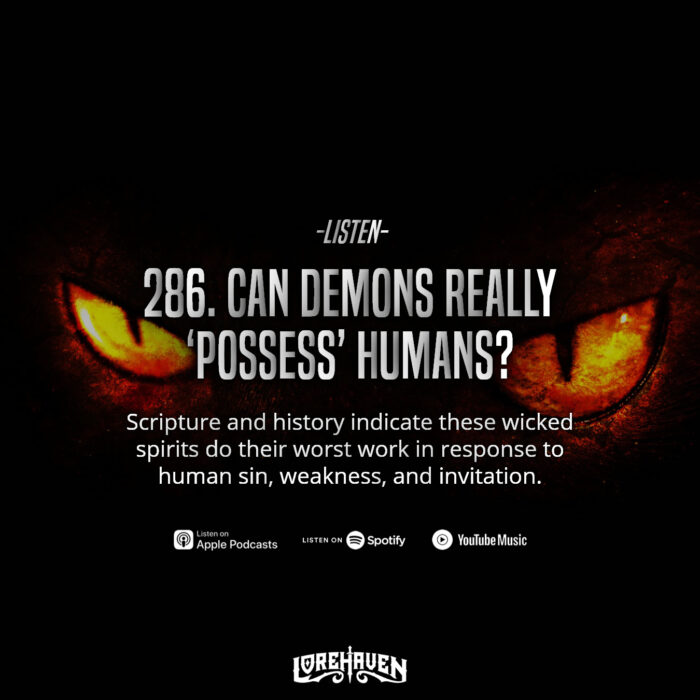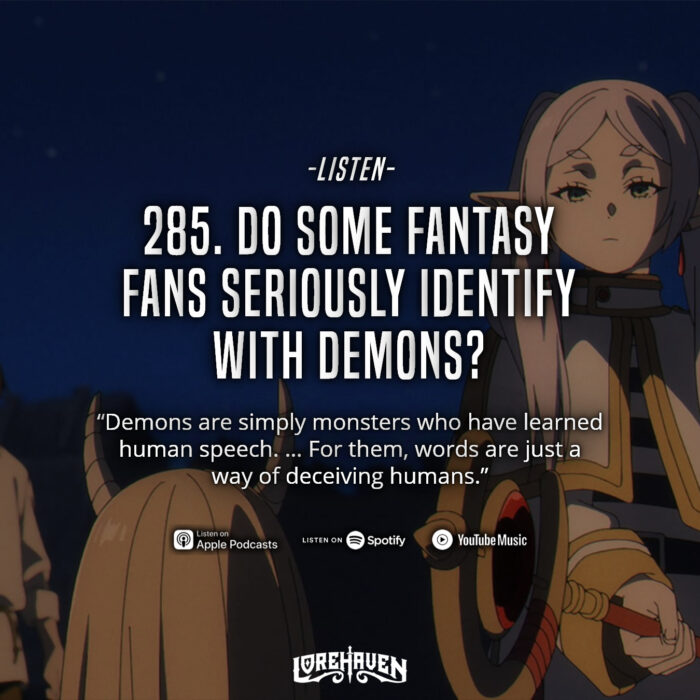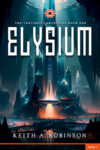286. Can Demons Really ‘Possess’ Humans?
Podcast: Play in new window | Download (Duration: 1:08:53 — 64.4MB) | Embed
Demons do bad things in the Bible and in the modern world. But how does a fallen spirit get around its limitations as an immaterial being? Meanwhile, how do creators of movies about demons get around the obvious budget limitations and need for showing not telling? Answer in both cases: demons “possess” people. Even in sci-fi the bad “entities” do this. But is this really the best word to use for how these Satanic agents can really influence, provoke, or oppress human beings?
Episode sponsors
- Audio-Epic.com: “1232” podcast
- The Seekers series by J. A. Webb
- Above the Circle of Earth by E. Stephen Burnett
Mission update
- New at Lorehaven: review for Sara Ella’s Glass Across the Sea
- Coming next: reviews for Lord of Winter and Picked Up Pieces
- Also new Onscreen: Demon Slayer: Infinity Castle Cuts a Careful Line Between Evil and Redemption by A. D. Sheehan
- Finally, @jenbooth.author won the Cultural Engagement Giveaway!
- Subscribe free to get updates and join the Lorehaven Guild
1. People love scary stories about demons.
- Jesus and the apostles often cast demons out of their victims.
- Acts has further accounts of what we call “demon possession.”
- Rumors of demons in society or the wild forests persist in history.
- Such supernatural narratives have long captured our imaginations.
- In all history, the present, and in fiction, we often blame demons.
- And we have many accounts and legends about possession.
- Christians make whole ministries about “spiritual warfare.”
- Frank E. Peretti memorably dramatized such encounters.
- Even pop culture loves the image of priests and exorcisms.
- Many movies, like Fallen with Denzel Washington, explore demons.
- A more Christian example is Nefarious, with its possessed killer.
- Even sci-fi gets in on the spooky, with tales of incorporeal entities
- Many a Star Trek story hosted these critters from a creepy storm planet, alternate dimension, and/or mystery nebula of the week.
- These inform our imaginations when we see horribly evil actions.
- People will say, “that’s demonic” or even “that is demons’ work.”
- Yet this habit goes way back in the Church—for good or ill.
2. ‘Demon possession is an unfortunate term’
The term demon possession is an unfortunate term that has found its way into some English translations of the Bible but is not really reflected in the Greek text. The Greek New Testament can speak of people who “have a demon” (Matt. 11:18; Luke 7:33; 8:27; John 7:20; 8:48, 49, 52; 10:20), but it never uses language that suggests that a demon actually “possesses” someone.
The problem with the terms demon possession and demonized is that they give the nuance of such strong demonic influence that they seem to imply that the person who is under demonic attack has no choice but to succumb to it. They suggest that the person is unable any longer to exercise his or her will and is completely under the domination of the evil spirit. While this may have been true in extreme cases such as that of the Gerasene demoniac (see. Mark 5:1–20; note that after Jesus casts the demons out of him, he was then “in his right mind,” v. 15), it is certainly not true with many cases of demonic attack or conflict with demons in many people’s lives.
—Wayne Grudem’s Systematic Theology, p. 423
- Grudem carefully reserves the term “demonized” for severe cases.
- He adds that all 13 instances of that Greek term are in the Gospels.
- Evil spirits also harass and “torment” people, like Saul (1 Sam. 14).
- This does not mean they are possessed, but deeply afflicted.
- Sam Storms’ Spiritual Warfare attributes a lot to demon influence.
- He does not attempt to sort demons’ power “sets” or ability levels.
- And he’s incurious about real issues like trauma and mental illness.
- We don’t yet know how these issues may mix with demons’ work.
- Stephen’s theory: demons may find troubled people less resistant.
- In other words, demons target people vulnerable from this trauma.
- That doesn’t mean these people “demonized” or “possessed.”
- In fact, it means they need repentance and faith like anyone.
- After that, demonic influence will be weakened if not eliminated.
- Such is the testimony of many people who played with evil spirits.
- When they called on Jesus, demons left and their healing began.
3. Spiritual warfare begins with our holiness.
Not All Evil and Sin is From Satan and Demons, but Some Is. If we think of the overall emphasis of the New Testament epistles, we realize that very little space is given to discussing demonic activity in the lives of believers or methods to resist and oppose such activity. The emphasis is on telling believers not to sin but to live lives of righteousness. For example, in 1 Corinthians, when there is a problem of “dissensions,” Paul does not tell the church to rebuke a spirit of dissension, but simply urges them to “agree” and “be united in the same mind and the same judgment” (1 Cor. 1:10).
—Grudem, p. 420
- We love biblical exorcisms best because they’re absolutely true.
- When our Lord drives out a demon, that critter is gone
- A true Christian will still struggle with personal sin, trauma, illness.
- Unrepentant sin could still lead to some influence by demons.
- But nothing in Scripture indicates demons could “take over” us.
Since the term demon possessed is a misleading one to use in all cases, especially when referring to Christians, I would prefer to avoid it altogether. It seems better simply to recognize that there can be varying degrees of demonic attack or influence on people, even on Christians, and to leave it at that. In all cases the remedy will be the same anyway: rebuke the demon in the name of Jesus and command it to leave …
—Grudem, p. 424–425
- At the same time, one wonders if we too have this same authority.
- John MacArthur, no “spiritual warfare” guru, suggests we may not.
- He tells of meeting a demon-oppressed girl with the classic signs.
I don’t think that demon was afraid of me humanly. I don’t have any human power to deal with demons. In fact, Jerry and I didn’t know what to do. We started trying to send the demons away. We sent them everywhere you could think of, the pit, the abyss, Phoenix, anywhere hot, you know. And the bottom…the bottom line is they didn’t go anywhere and so we just were praying and saying, “You know, this isn’t working, this casting out thing isn’t working. I’m not Jesus and we’re not apostles and we don’t have authority over that kingdom.” There’s only one way that this girl will ever be delivered and that is when Christ delivers her in the act of salvation. So we wrestled, literally physically trying to restrain her and get her in a chair and she was so exhausted physically and finally calmed down and we gave her the gospel. And she confessed her sin. I’ll never forget it, just really gushed out her sin before the Lord and embraced Jesus Christ and then it was just this calm that came everywhere. There was deliverance. Nothing to do with me, nothing to do with a formula, nothing to do with an exorcism, nothing to do with that at all, that…that is not what deals with demons. She needed to be delivered from the kingdom of darkness, you understand that? And she was. She was.
—John MacArthur sermon transcript from Grace to You, “Jesus’ Authority over Demons, Part 2,” July 16, 2000
- Many saints, however, have told of their authority over demons.
- Why didn’t that work with MacArthur? or in other situations?
- And even Peretti acknowledges some demons can whoop saints.
- Are these the “edge cases”? Or did MacArthur need more training?
- Again, Stephen’s theory: mental illness may give demons an edge.
- Christian cast exorcism! Demon used bipolar! Exorcism ineffective!
- But if the Holy Spirit moves into the “house,” there’s no room left.
- That’s why healing must begin with the gospel, which leads to our journey toward constant repentance, recovery from trauma, etc.
- For those with mental illness, certain therapy and meds may help.
- Either way, casting out demons won’t redeem a soul. Christ will.
- Open discussion
Com station
Top question for listeners
- What real or fictional accounts of so-called “demon possession” or demonic oppression have you heard?
Next on Fantastical Truth
To fight real monsters, we don’t need toxic empathy or the notion that exorcisms can resolve all demonic problems. Instead we start with the gospel of Jesus Christ that alone brings holiness. Yet how do we also train our imaginations with better stories to help us battle the beasts? Geoffrey Reiter returns to the studio to explore how great literature reflects God’s grace that helps us defeat the darkness.





























Share your thoughts about this podcast episode